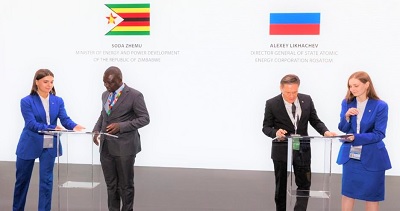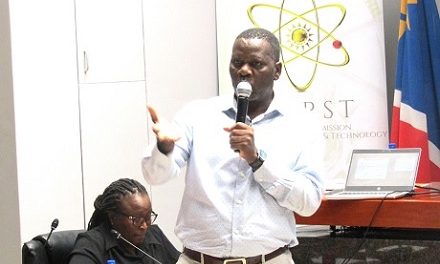Staff Reporter /
Russia and Zimbabwe have entered into a cooperative agreement that paves the way for joint efforts in harnessing atomic energy for peaceful purposes.
This agreement was officially signed by Alexey Likhachev, the Director General of Rosatom, representing Russia, and Soda Zhemu, the Minister of Energy and Power Development of Zimbabwe.
The agreement sets out a comprehensive framework for collaboration between the two nations in various facets of atomic energy utilization.
One of the key focuses of the agreement is the assistance provided by Russia to Zimbabwe in the establishment and enhancement of the latter’s nuclear infrastructure, all in line with international standards and guidelines.
This encompasses a range of critical elements, including the regulation of nuclear and radiation safety.
Moreover, the collaboration extends to the production and application of radioisotopes in sectors such as industry, medicine, and agriculture.
The shared endeavors are expected to lead to advancements in technology and healthcare practices, as both nations leverage the benefits of atomic energy for the betterment of society.
Education and knowledge transfer also feature prominently in the agreement. Russia will actively participate in the training and development of specialists for Zimbabwe’s burgeoning nuclear industry.
This proactive exchange of knowledge is poised to bolster the expertise of professionals in the field, creating a positive ripple effect on the advancement of nuclear technology in both countries.
The roots of this collaborative stride can be traced back to a Memorandum of Understanding (MoU) inked between Rosatom and Zimbabwe’s Ministry of Energy and Power Development.
This MoU, which was signed on the sidelines of the 65th session of the IAEA General Conference in Vienna, laid the groundwork for the comprehensive agreement that has now been formalized.
The joint efforts between Russia and Zimbabwe are poised to not only bolster each nation’s atomic energy capabilities but also enhance international cooperation in the responsible use of nuclear technology.
As the world seeks cleaner and more sustainable energy solutions, such collaborations serve as beacons of progress, reflecting a shared commitment to innovation and harmonious development.
In the photo: Russian and Zimbabwean officials completing the paperwork signifying the beginning of a nuclear era for the SADC country.







